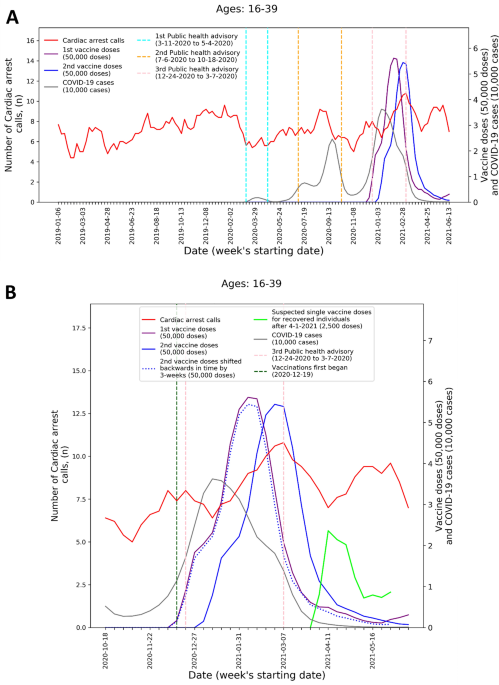:

Abstract
Cardiovascular adverse conditions are caused by coronavirus disease 2019 (COVID-19) infections and reported as side-effects of the COVID-19 vaccines. Enriching current vaccine safety surveillance systems with additional data sources may improve the understanding of COVID-19 vaccine safety. Using a unique dataset from Israel National Emergency Medical Services (EMS) from 2019 to 2021, the study aims to evaluate the association between the volume of cardiac arrest and acute coronary syndrome EMS calls in the 16–39-year-old population with potential factors including COVID-19 infection and vaccination rates. An increase of over 25% was detected in both call types during January–May 2021, compared with the years 2019–2020. Using Negative Binomial regression models, the weekly emergency call counts were significantly associated with the rates of 1st and 2nd vaccine doses administered to this age group but were not with COVID-19 infection rates. While not establishing causal relationships, the findings raise concerns regarding vaccine-induced undetected severe cardiovascular side-effects and underscore the already established causal relationship between vaccines and myocarditis, a frequent cause of unexpected cardiac arrest in young individuals. Surveillance of potential vaccine side-effects and COVID-19 outcomes should incorporate EMS and other health data to identify public health trends (e.g., increased in EMS calls), and promptly investigate potential underlying causes.
---------------------------------------------------------
:

The significant increases in CA calls and ACS calls among the 16–39 age population during the COVID-19 vaccination rollout highlights the value of additional data sources, such as those from EMS systems, that can supplement self-reporting surveillance systems in identifying concerning public health trends. Moreover, it underscores the need for the thorough investigation of the apparent association between COVID-19 vaccine administration and adverse cardiovascular outcomes among young adults. Israel and other countries should immediately collect the data necessary to determine whether such association indeed exists, including thorough investigation of individual CA and ACS cases in young adults, and their potential connection to the vaccine or other factors. This would be critical to better understanding the risk-benefits of the vaccine and to inform related public policy and prevent potentially avoidable patient harm. In the interim, it is vital that following vaccination, patients should be instructed to seek appropriate emergency care if they are experiencing symptoms potentially associated with myocarditis, such as chest discomfort and shortness of breath, as well as consider avoiding strenuous physical activity following the vaccination that may induce severe adverse cardiac events.




